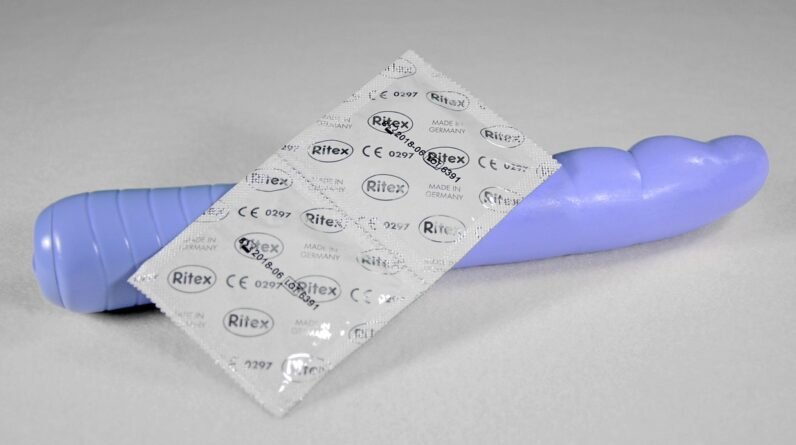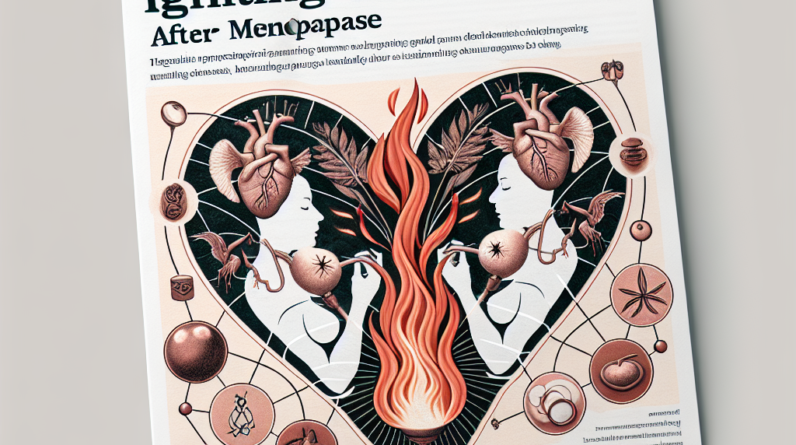
As you approach the milestone age of 50, you may find yourself pondering a question that many people are curious about yet hesitant to discuss openly: is it normal to have no sex after 50? Aging and menopause can bring about changes in our bodies, leading to fluctuations in our sex lives. But fear not, because in this article, we will explore ways to embrace and maintain a fulfilling sex life in older age and beyond menopause. So, let’s dive into the topic and discover the secrets to enjoying intimacy and pleasure well into your golden years.

This image is property of pixabay.com.
Factors Affecting Sexual Activity after 50
As you enter your 50s and beyond, various factors can influence your sexual activity. Understanding these factors is essential to navigate any challenges and maintain a fulfilling and satisfying sex life. From physical changes in the body to hormonal fluctuations, medical conditions, psychological factors, relationship dynamics, and even cultural influences, there are numerous aspects to consider. By exploring each factor, you can gain insight into how they can impact your sexual health and find ways to address and improve it.
Physical Changes in the Body
One significant factor that can affect sexual activity after 50 is the physical changes that occur in your body. It’s important to remember that these changes are a natural part of aging, and you are not alone in experiencing them. Some common physical changes include decreased libido, erectile dysfunction, vaginal dryness, and pain or discomfort during sex.
Decreased Libido
A decline in libido or sex drive is a common occurrence as you age. This can be attributed to a variety of factors, including hormonal changes and the effects of aging on the body. It’s important to remember that a lower sex drive doesn’t mean there is something wrong with you or your relationship. Open communication with your partner and seeking support from healthcare professionals can help you navigate this change and find ways to enhance your sexual desire.
Erectile Dysfunction
For men, erectile dysfunction becomes more prevalent with age. This condition involves difficulty in achieving or maintaining an erection. While it can be frustrating, it’s important to remember that erectile dysfunction is treatable. Seeking medical advice and exploring different treatment options, such as medication, therapy, or lifestyle changes, can help overcome this challenge and restore sexual function.
Vaginal Dryness
Women may experience vaginal dryness as a result of hormonal changes, particularly during menopause. This can lead to discomfort or pain during intercourse. Using lubricants designed for sexual activity can help alleviate the symptoms of vaginal dryness and make sex more enjoyable. Additionally, engaging in longer foreplay, which includes physical and emotional stimulation, may help increase natural lubrication.
Pain or Discomfort during Sex
Both men and women may experience pain or discomfort during sex as they age. This can occur due to various factors, such as hormonal changes, medical conditions, or even psychological factors. It’s crucial to communicate openly with your partner about any discomfort or pain experienced during sexual activity. Seeking medical advice can help identify the underlying cause and explore potential solutions to address the issue effectively.
Hormonal Changes
Hormonal changes play a significant role in sexual health, and they can affect both men and women as they age. Understanding these changes can help you navigate any challenges and seek appropriate interventions.
Decreased Testosterone
For men, testosterone levels decrease with age. This decline in testosterone can lead to a decrease in sexual desire, erectile dysfunction, and reduced energy levels. If you suspect low testosterone may be affecting your sexual health, it is essential to consult with a healthcare professional who can evaluate your hormone levels and provide appropriate treatments, such as hormone replacement therapy.
Estrogen Fluctuations
Women experience fluctuations in estrogen levels, particularly during menopause. These hormonal changes can impact sexual desire, vaginal health, and overall well-being. Engaging in open conversations with your partner, seeking medical advice, and considering hormone therapies can help manage the effects of estrogen fluctuations and maintain a satisfying sex life.
Menopause
Menopause is a natural phase in a woman’s life, typically occurring between the ages of 45 and 55, during which menstruation ceases, and fertility declines. Menopause can have various effects on a woman’s sexual health, including its impact on sexual desire, changes in vaginal health, and psychological and emotional changes.
Impact on Sexual Desire
During menopause, some women may experience a decline in sexual desire. This can be attributed to hormonal changes, physical discomfort, or psychological factors related to the aging process. Open and honest communication with your partner, along with seeking support from healthcare professionals, can help address any changes in sexual desire and find ways to enhance intimacy and pleasure.
Effects on Vaginal Health
Menopause often leads to changes in vaginal health, characterized by decreased natural lubrication and elasticity. These changes can result in discomfort or pain during intercourse. Using water-based lubricants and engaging in longer foreplay can help ease discomfort and enhance sexual pleasure. Additionally, hormone therapies or vaginal moisturizers recommended by healthcare professionals can aid in maintaining vaginal health.
Psychological and Emotional Changes
Menopause is a life transition that can bring about psychological and emotional changes. Mood swings, irritability, and feelings of sadness or loss are not uncommon during this period. These emotional changes may affect your sexual health and desire. Seeking emotional support from loved ones, participating in activities that bring you joy, and considering counseling or therapy can help manage these changes and promote overall well-being.

This image is property of pixabay.com.
Medical Conditions and Medications
Existing medical conditions and medications can significantly impact sexual activity after 50. It is important to consider these factors and work with healthcare professionals to manage any potential obstacles.
Chronic Illnesses and Their Impact
Chronic illnesses, such as diabetes, cardiovascular diseases, or neurological conditions, can affect sexual health and function. These conditions may cause physical limitations, fatigue, or pain that can make sexual activity challenging. Working closely with your healthcare team to manage your condition effectively can help minimize the impact on your sexual health. Additionally, exploring alternative forms of intimacy and adapting to physical changes can help maintain a fulfilling and satisfying sex life.
Side Effects of Medications
Certain medications prescribed for chronic illnesses or other health conditions may have side effects that impact sexual health. These side effects may include decreased libido, erectile dysfunction, or changes in sexual function. It is crucial to discuss any concerns or issues with your healthcare provider, who may be able to adjust or change medications to mitigate these effects while still managing your overall health effectively.
Psychological Factors
Psychological factors can heavily influence sexual health, regardless of age. It’s important to address and understand these factors to maintain a satisfying and pleasurable sex life.
Stress and Anxiety
Stress and anxiety can impact sexual desire and performance. The demands of daily life, personal or professional challenges, and other stressors can affect your ability to engage in sexual activity. It’s essential to find healthy coping mechanisms for stress, practice relaxation techniques, and communicate openly with your partner about any concerns. Seeking therapy or counseling can also help you navigate stress and anxiety effectively.
Depression
Depression can significantly affect sexual health and desire. Feelings of sadness, hopelessness, or a loss of interest in activities you once enjoyed can impact your sexual well-being. Consulting with a mental health professional is crucial in managing and treating depression effectively. They may offer therapeutic interventions or prescribe appropriate medication to improve your mental health and restore sexual desire.
Body Image Concerns
Body image concerns can affect individuals of all ages, including those over 50. As the body undergoes natural changes with age, it’s common to experience feelings of self-consciousness or dissatisfaction. These concerns can impact sexual confidence and desire. It’s important to cultivate self-acceptance, practice self-care and self-love, and engage in open communication with your partner. Building a supportive and understanding intimate relationship can help overcome body image concerns and enhance sexual satisfaction.
Self-esteem Issues
Self-esteem plays a crucial role in sexual health and well-being. Low self-esteem can diminish your confidence in engaging in sexual activity and expressing your desires. Practicing self-care, engaging in activities that bring you joy and confidence, and seeking support from loved ones can boost your self-esteem. Additionally, professional therapy or counseling can provide guidance in building self-esteem and improving your sexual health.

This image is property of pixabay.com.
Relationship Dynamics
The dynamics within a relationship can significantly impact sexual activity, and as you age, it’s important to reassess and communicate effectively to maintain a satisfying and fulfilling intimate connection.
Communication Breakdown
Open and honest communication with your partner about your sexual needs, desires, and any concerns is crucial for a healthy sexual relationship. As time goes on, it’s common for communication to deteriorate or become less frequent. Making an effort to engage in regular communication, actively listening to your partner’s needs, and expressing your own can help strengthen intimacy and maintain a satisfying sexual connection.
Lack of Emotional Intimacy
Emotional intimacy is a vital component of a fulfilling sexual relationship. Over time, it’s natural for emotional connections to fluctuate or weaken. Prioritizing emotional intimacy through activities like shared experiences, date nights, or deep conversations can rekindle the emotional bond and enhance sexual satisfaction.
Changes in Sexual Preferences
As you age, your sexual preferences and desires may change. It’s important to remain open-minded and adaptable to these changes within your relationship. Engaging in open and non-judgmental conversations with your partner, exploring new experiences together, and being willing to try different things can help maintain a fulfilling and exciting sexual relationship.
Cultural and Societal Influences
Cultural and societal influences can impact how individuals perceive and engage in sexual activity after 50. Understanding these influences is essential to challenge stereotypes, address ageism, and promote healthy sexual norms for older adults.
Stereotypes and Ageism
Society often perpetuates stereotypes and ageism, suggesting that older adults should lose interest in or abstain from sexual activity. It’s crucial to recognize that these stereotypes are unfounded and can be harmful. Embracing your sexuality and challenging societal norms can help promote positive attitudes towards sexual activity after 50 and encourage a healthier and more inclusive sexual culture.
Lack of Sex Education for Older Adults
A lack of comprehensive sex education for older adults can contribute to misconceptions and misunderstandings about sexual health as you age. Educating yourself and seeking reliable sources of information regarding sexual health after 50 can help dispel common myths and ensure you have accurate knowledge to make informed decisions about your sexual well-being.
Taboos and Social Stigma
Taboos and social stigma surrounding sexuality after 50 can deter individuals from seeking help or discussing their needs and desires openly. It’s important to challenge these taboos within yourself and your social circle. Encouraging open conversations about sexuality, promoting inclusivity, and creating a non-judgmental space can help destigmatize sexual activity after 50 and foster a more accepting society.

Importance of Sexual Activity
Maintaining a fulfilling and satisfying sex life after 50 brings numerous physical and mental health benefits, strengthens relationships, and enhances self-confidence. Understanding the importance of sexual activity can serve as a motivation to address and improve your sexual health.
Physical and Mental Health Benefits
Sexual activity offers a myriad of physical and mental health benefits. It can improve cardiovascular health, boost the immune system, reduce stress and anxiety, enhance sleep quality, and increase overall well-being. Engaging in regular sexual activity promotes the release of endorphins, which are natural mood enhancers, and strengthens the bond with your partner.
Strengthening Relationships
Sexual intimacy plays a vital role in strengthening and deepening the emotional connection within a relationship. Sharing intimate moments can foster trust, increase feelings of closeness, and contribute to overall relationship satisfaction. Engaging in sexual activity after 50 promotes continued emotional connection and enhances the quality of the relationship.
Enhancing Self-Confidence
A satisfying and pleasurable sex life can greatly improve self-confidence and self-esteem. Feeling desired and experiencing sexual pleasure can help boost your confidence in other areas of life, enhance body image, and promote overall self-assurance. Investing in your sexual well-being can benefit your overall confidence and outlook on life.
Addressing and Improving Sexual Health after 50
To address and improve sexual health after 50, it’s important to consider a range of strategies and approaches. By implementing the following suggestions, you can navigate any challenges and foster a more fulfilling and satisfying sex life.
Open and Honest Communication
Engaging in open and honest communication with your partner about your sexual desires, concerns, and needs is vital. Encourage an environment of trust and understanding, where both of you feel comfortable expressing your desires and exploring potential solutions together. This open dialogue can lead to a deeper emotional connection and enhance sexual satisfaction.
Seeking Professional Help
If you’re experiencing challenges or concerns regarding your sexual health, seeking professional help is essential. Healthcare providers, including doctors, gynecologists, or sexual health therapists, are trained to address a wide range of sexual concerns and can provide guidance, support, and potential treatment options tailored to your needs.
Exploring Different Forms of Intimacy
Sexual intimacy encompasses more than just penetrative sex. Exploring different forms of intimacy, such as sensual massage, cuddling, kissing, or engaging in shared activities, can help maintain closeness and satisfaction in your relationship. By broadening your definition of intimacy, you can discover new ways to connect and find pleasure.
Managing Medical Conditions
Managing any existing medical conditions effectively plays a vital role in preserving sexual health after 50. Adhering to treatment plans, attending regular check-ups, and maintaining a healthy lifestyle can minimize the impact of chronic illnesses on sexual activity. Collaborating closely with your healthcare team can help you navigate any potential obstacles and maintain your overall well-being.
Adapting to Physical Changes
Adapting to physical changes that occur with age is important when it comes to sexual health. Being patient with yourself and your body, adapting sexual positions or techniques to accommodate any physical limitations, and exploring ways to enhance pleasure despite these changes can help maintain a satisfying sex life. Remember that sexual pleasure can still be achieved, even if it requires some adjustments.
Using Lubricants and Other Aids
If vaginal dryness or erectile dysfunction is a concern, using appropriate lubricants or aids can greatly enhance sexual comfort and pleasure. Water-based lubricants can be used to alleviate vaginal dryness and make intercourse more enjoyable. Additionally, devices such as vibrators or other intimacy aids can assist individuals in achieving sexual pleasure.
Maintaining a Healthy Lifestyle
Maintaining a healthy lifestyle is crucial for overall well-being, including sexual health. Engaging in regular physical activity, eating a balanced diet, getting enough sleep, managing stress, and avoiding excess alcohol or tobacco can positively impact your sexual health. Prioritizing self-care and maintaining good overall health can contribute to a fulfilling and satisfying sex life after 50.
Cultivating Emotional Connection
A strong emotional connection is fundamental to a satisfying sexual relationship. Cultivate emotional connection by engaging in activities that promote bonding, such as meaningful conversations, shared experiences, or pursuing common interests. Building emotional intimacy can lead to a deeper connection between partners, enhancing sexual satisfaction and overall relationship quality.
Sexual activity after 50 is influenced by a variety of physical, hormonal, psychological, and relational factors. Understanding these factors and their impact can help you navigate any challenges and maintain a fulfilling and satisfying sex life. By addressing concerns, seeking professional help when needed, and implementing strategies to promote intimacy and well-being, you can continue to enjoy a healthy and rewarding sex life well into your later years. Remember, it’s never too late to prioritize your sexual health and seek the pleasure and intimacy you deserve.






